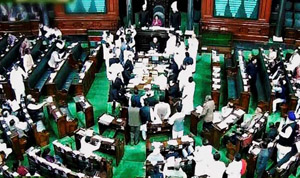New Delhi, Mar 16: Opposition parties in Parliament today vociferously protested the "snooping" on Rahul Gandhi, with the government dismissing their contention saying they were making a "mountain out of what is not even a molehill", leading the Congress to walk out of Rajya Sabha.
The government maintained in both the Houses that Delhi Police personnel had recently visited Rahul's residence to collect information on him as part of a transparent security profiling that was used to profile 526 other VIPs, including former Prime Ministers and Sonia Gandhi since UPA rule.
In the Rajya Sabha, the issue was raised by Leader of Opposition Ghulam Nabi Azad who said Rahul had been a SPG protectee since his father Rajiv Gandhi became Prime Minister and it was "beyond comprehension" why the police was only now collecting such information on him like his shoe size, colour of hair, habits, his associates, friends and aides.
His senior party colleague Anand Sharma accused government of tapping phones of political leaders, judges and others through imported devices and demanded an inquiry monitored by the Supreme Court into the snooping issue.
The Upper House also saw Satyavrat Chaturvedi (Cong), Naresh Agarwal and Ramgopal Yadav (both SP) and K C Tyagi (JD-U) raising the issue of "snooping and spying" on the government's political opponents.
In the Lok Sabha, Congress leader Mallikarjun Kharge said the NDA government was pursuing the Gujarat model of governance by snooping on political opponents.
"This has never happened in democracy," Kharge said and asked the government to tell police officials to read 'Who's Who' instead of seeking simple information from the persons concerned.
Responding to the charges, Leader of Rajya Sabha and Finance Minister Arun Jaitley said in both Houses the police has been collecting such information since 1987 on VIPs living in Lutyens Delhi through a proforma as part of a transparent security profiling.
Security needs and profiling should be left to security experts and "we should not attempt to become one", he said, adding "the issue raised is making mountain of what is not even a molehill."
The proforma, which was revised in 1999, has been used to profile former prime ministers H D Dewa Gowda, I K Gujral, Manmohan Singh and Atal Bihari Vajpayee. The same was also used to profile Congress President Sonia Gandhi in October 2004, 2009, 2010, 2011 and 2012, he said.





Comments
Add new comment